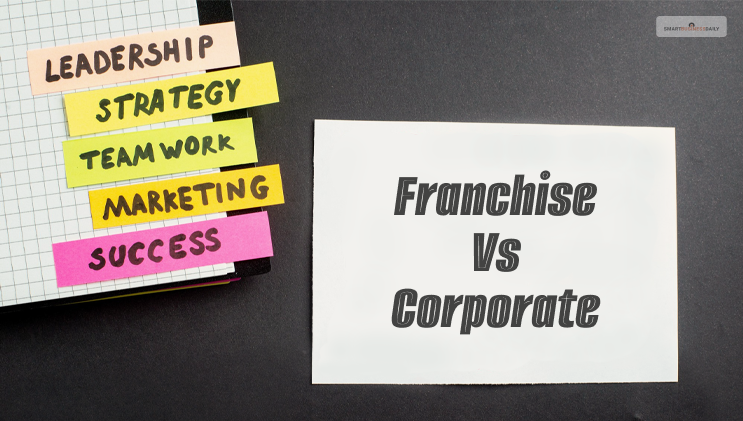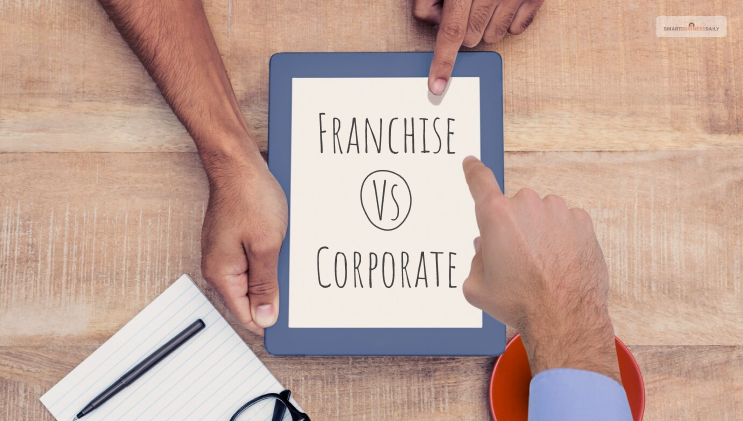Franchise Vs Corporate: Major Differences, Significance, And Examples
March 2, 2024

toc impalement
Franchise vs Corporate – These are two different options for business owners to structure their business for growth. When you are creating your business and want to invest in its growth, you will need to consider its operations and structure. Once you explore the significant differences between a franchise and a corporation, you can understand their functions and the major operation standards that apply.
In this article, you will learn about franchises and corporations in general. This article will show you the major structural differences and how they differ in terms of control and motivation. You will also learn other aspects like hiring, strategizing, business, and more. Finally, you will get to choose which one is the right option for you based on the pros and cons of both. Hence, to learn more, read on through to the end of the article.
Franchise Vs Corporate: Definitions


According to Investopedia,
“A franchise is a type of license that grants a franchisee access to a franchisor’s proprietary business knowledge, processes, and trademarks, thus allowing the franchisee to sell a product or service under the franchisor’s business name. In exchange for acquiring a franchise, the franchisee usually pays the franchisor an initial start-up fee and annual licensing fees.”
The business that offers its franchise to other businesses is called the franchisor. On the other hand, the one that buys the franchise is called a franchisee. All the members of a franchise need to follow the Franchise Rules. As per the rule, the franchisor needs to disclose its key operating information to its prospective franchisees.
According to the Corporate Finance Institute,
“A corporation is a legal entity created by individuals, stockholders, or shareholders, with the purpose of operating for profit. Corporations are allowed to enter into contracts, sue and be sued, own assets, remit federal and state taxes, and borrow money from financial institutions.”
There are many differences between a startup and a corporation. Basically, the owners of a corporate structure strive to separate themselves from the business. Here, the owner of the business is anyone who has a stock or share in the corporation. A corporation can be of two types – C corporation and S corporation.
In a C corporation, the owners have to file taxes separately from the business entity. On the other hand, shareholders have the ability to file taxes on the business, as it happens in a partnership business.
Franchise Vs Corporate: Control And Motivation


The owners of a franchise need to follow the franchise system as developed by the franchisor. However, the franchisee also possesses some flexibility to manage and operate its own business. Despite that, they will need to follow the rules as per the franchise agreement.
Hence, a franchise gets the opportunity to own and run the business model that has proved to be successful in the market. Apart from that, franchise owners also get the freedom to make strategic decisions as business owners. However, the latter depends on a variety of factors.
On the other hand, the managers of a corporation do not have the highest right to make business decisions. Here, the Board of Directors of the corporation makes the business decision. They then ensure that the decisions find uniform applications across the organization.
As per the motivation to grow the business, the owners of a franchise involve themselves in the day-to-day operations of the business. This is because they invest themselves personally and financially in the success of the business. Here, franchise owners not only invest their money to buy the franchise, they continue to pay ongoing royalties to the franchisor.
Meanwhile, the managers of a corporation are not involved in the small details of the business like a franchise owner. This is because they do not have financial investments in the success of the business. Basically, franchisees have a hands-on approach while running a business since they make financial investments to keep the franchise model.
Franchise Vs Corporate: Structural Differences
The franchise operates when a business owner purchases it from a franchisor and becomes a franchisee. They need to pay and have to review a franchise agreement. Only then, can they operate the business using the model of the franchisor. Apart from that, there are other costs related to real estate, franchise fees, and inventory.
In the case of a franchise, each location of the business has a separate owner. Here, each of these locations is known as a franchisee. Each franchisee business needs to pay an initial franchise fee as well as recurring royalty fees to the franchisor. In return, the franchisee gets training and support from the franchisor on how to grow the business. Hence, the franchisee gets the support and security of a proven business model.
On the other hand, Small Biz Trends adds –
“The corporation is a parent company. With the corporate structure, a chain store is opened. The corporation is responsible for the operations of the chain, handling all business decisions and overseeing all operations. There are managers and employees hired by the corporation.”
As a result, in a corporation, the new owners of the business are integrated into the company. Here, the store managers are not independent from the business. Rather, they follow the directions and orders of the main business. All the units are essentially part of a single business only.
To become a corporation, the business needs to incorporate itself. Hence, the business owners get protection from being personally liable in the event of a claim or lawsuit against the business. The incorporation process contains the legal document that shows the details of the business, the number of shares, and the stock issued for the business.
Franchise Vs Corporate: Growth And Marketing


If you buy a franchise, you will have a higher chance of growth than a corporation. To open new locations for the business, the franchisor does not need a substantial amount of capital. Here, the franchisor gives other entrepreneurs the option to invest in the already-established brand. Hence, a new business owner starts working in a tried-and-tested business model. As a result, it is a win-win situation for both the franchisor and the franchisee.
According to Small Biz Trends –
“Often a successful business became a franchise because going that route allowed the original owner to hang on to capital and raise money for expansion. Each time someone purchased a franchise, a franchise fee was paid. In addition, the franchisee usually paid royalties on income as well. Bringing in this income allowed the franchisor to quickly grow the company.”
However, the growth of the corporation is inside. Hence, the growth is slow since the business needs to fund new operations and locations. Thereby, they allow the public to buy the shares of the business and gain some ownership. The individual/ business with the most share has more say in the operations of the business.
Apart from that, the most interesting thing about both franchise and corporation businesses is that both have a uniform and brand-centric marketing approach.
In a franchise system, the franchisor’s marketing efforts actually help the franchisees to grow in their respective locations. This happens as people become aware of the product and service of the business. However, in some cases, the franchisee has the freedom to implement its own marketing efforts with the franchisor’s permission.
In a corporation, the branches of the main business have limited control over the marketing campaigns of the brand. However, the brand also provides marketing materials to the branches.
Franchise Vs Corporate: Differences In Hiring And Staffing
When it comes to hiring decisions, franchisees have a lot of flexibility. This is because they are the ones that are operating at the local level in regard to business and finances. Apart from that, a franchisor might also provide a standard for new hires to follow. However, the franchisor will not involve itself with the regular process of employee management.
On the other hand, the job of the corporation is to take over the responsibility of staffing their branch with employees and managers. The HR management system is hierarchical and provides ample information, support, and resources for store managers/ business branches to follow. Hence, in local corporate branches, the hiring and staffing processes go on the same way as the main branch.
Franchise Vs Corporate: Differences At The Business Level


Indeed.com adds –
“Corporations offer public stocks and shares and create a responsibility to make decisions for the best interest of their external and internal stakeholders. Stakeholders for a corporation include a board of directors, executives and shareholders. The stakeholders who possess a large share of the corporation have a large influence over the management decisions and processes of the corporation and require frequent meetings, votes and approvals.”
In a corporation, the structure of the organization protects the shareholders of the company from any legal trouble. However, this does not work in case shareholders go bankrupt. Basically, since there is limited liability in a corporation, a legal dispute with the business does not affect the assets of the business.
As compared to a corporation, a franchise bears more legal liabilities. Hence, if there are legal disputes with a franchisee. Hence, a franchisee also needs to strictly adhere to the rules and regulations of the franchise. Otherwise, any legal dispute will affect the entire brand.
Furthermore, when it comes to the management of the inventory of the organization, a franchise mainly deals with a hands-on approach. Apart from that, a franchisor often provides fixed suppliers. Additionally, the franchisee has to follow manual guidelines by the franchisor to handle inventory and purchases.
On the other hand, corporate store managers actively take part in stocking their shelves. However, the size of the store determines the level of involvement of the store managers. Moreover, the headquarters of the corporation actually handles all the stores’ accounting processes.
Franchise Vs Corporate: Which One Is Right For You?
If you want to open a franchise, you can hire franchise consultants to find the right franchises for you. It is important to understand the business structure of both the franchise and the corporation. Although there are similarities between the two, the differences have a direct impact on the structures of both. They impact the operations, growth, and legal matters of the business.
Franchise Vs Corporate: Major Pros And Cons


Here are the major pros and cons of franchises and corporations:
There are many benefits of creating a franchise. The following are the major pros and cons of a franchise that you must know:
Pros Of A Franchise
Here are the major pros of a franchise that you must know:
- They come with a ready-made business plan for the franchisee to follow.
- The franchisor can secure financing to start a franchise.
- Franchises are less risky to start than independent businesses since you are working on an already-established idea.
Furthermore, the future of franchise ownership shows that home-owned franchises will become popular.
Cons Of A Franchise
Here are a few cons of a franchise that you must be aware of:
- Startup costs are high
- Lack of flexibility
- Franchise fees can add up for the franchisee
- The business is not in full control of the franchisee
The following are the major pros and cons of a corporation that you must know:
Pros Of A Corporation
Here are the major pros of a corporation that you must know:
- The business gets to protect its personal liability
- Higher security and flexibility
- Higher access to capital
- Major tax benefits for the owners as well as the business
Cons Of A Corporation
Here are a few cons of a corporation that you must be aware of:
- It is expensive to create a corporation
- The application process is lengthy
- There are many protocols and formalities to follow
- Double taxation system
- There are lobbying at the director level
Summing Up
Franchise vs Corporate – If you want to start a new business, opening a franchise will provide you with great opportunities. However, to start with a high-profile franchise, you will need to have a lot of capital at your disposal. On the other hand, to create a corporation, you will need to establish your business and then incorporate it.
Do you have further suggestions to add regarding franchises and corporations? Consider sharing them in the comments below.
Continue Reading:


















0 comment
Capital markets March 3, 2024 at 8:14 am
Approach to challenges comparable to a personalized lead generation strategy – always finding opportunities.
Fitspresso March 4, 2024 at 7:56 pm
I do agree with all the ideas you have introduced on your post They are very convincing and will definitely work Still the posts are very short for newbies May just you please prolong them a little from subsequent time Thank you for the post